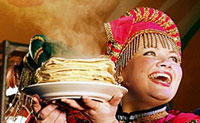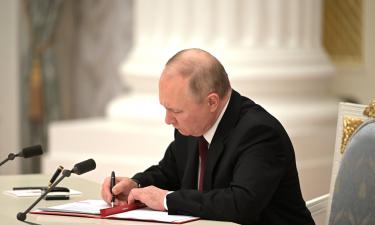Russians Stuff Themselves with Pancakes and Ask Forgiveness
There is no other holiday in Russia that would be as fun and wild as Maslenitsa (also known as Butter Week, Pancake Week and Shrovetide). During seven long weeks after the holiday people will have to rid themselves of worldly sins, which means no fun, no dances and no laughing. To this day, people believe that if they don’t celebrate Maslenitsa the proper way they would live in misery for the rest of the year. Maslenitsa 2010 will start on February 8 and will continue through February 14.

History of Maslenitsa is rooted in the ancient past. It is an old Slavic holiday inherited from pagan culture and preserved after the acceptance of Christianity. Initially, Maslenitsa was a sun festival, but with the acceptance of Christianity it became the holiday celebrated the last week before the onset of Great Lent.
There are several traditions observed during Maslenitsa. During Maslenitsa week, meat is already forbidden to Orthodox Christians. The period between the Christmas Lent and spring lent nears its end, and the Sunday before Maslenitsa is the last day when meat is allowed. During Maslenitsa people allowed to eat dairy products and fish. The main food of Maslenitsa week is pancakes made every day that week starting Monday. A pancake symbolizes the sun. The bulk of pancakes are made Thursday through Sunday, the time called Wide Maslenitsa. Eating during Maslenitsa is the main form of life. Old sayings mention that during Maslenitsa people should eat as many times as a dog wags its tail or a crow croaks. Unlike during other holidays, gluttony is practiced not only at home but while visiting friends or having people over.
At the culmination of the celebration it was customary to organize real feasts with entertainment on the main streets of cities and villages. People celebrated from dusk till dawn. Some dressed in costumes and walked in the streets carrying a straw effigy of Lady Maslenitsa, a symbol of leaving winter. People made bonfires and threw old clothes and household items into the fire. They installed a tall pole with a wheel on top, symbolizing the bright sun, on the central square.
Maslenitsa is also a family holiday. People associate spring with the beginning of new life. In old times young people who got married a year earlier were honored during Maslenitsa. They were given sleigh rides around the village, but if the newlyweds did not provide tasty treats they were thrown in the snow face down. Catholics and people in some Ukrainian villages have a tradition of punishing those not married. They believe unmarried people are against the God’s law. During Maslenitsa they would tie a special boot to the legs of single people and make them walk around like this all day.
The last day of MaslenitsaWeek is called "Forgiveness Sunday." Traditionally this day people ask their family and friends for forgiveness to receive the answer: “God will forgive.”
Subscribe to Pravda.Ru Telegram channel, Facebook, RSS!





